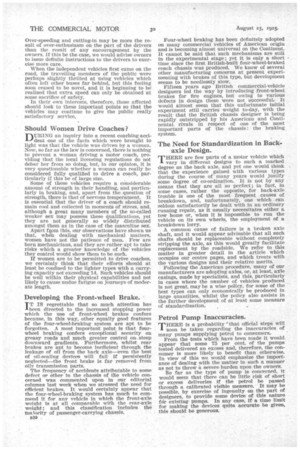Developing the Front-wheel Brake.
Page 2

If you've noticed an error in this article please click here to report it so we can fix it.
T T IS regrettable that so much attention has been directed to the increased stopping power which the use of front-wheel brakes confers because, in this way, other equally good features of the four-wheel-braking system are apt to be forgotten. A most important point is that fourwheel braking confers exceptional security on greasy roads and much greater control onsteep downward gradients. Furthermore, whilst rear brakes are apt to become Inefficient through the leakage of oil from the back axle—even the best of oil-sealing devices will fail if persistently neglected—the front brake is far removed from oily transmission parts. The frequency of accidents attributable to some defect or other in the chassis of the vehicle concerned was commented upon in our editorial columns last week when we stressed the need for efficient brakes. It would certainly appear that the four-wheel-braking system has much to commend it for any vehicle in which the front-axle weight is at all comparable with the rear-axle weight; and this classification 'includes the maiority of passenger-carrying chassis.
B20 Four-wheel braking has been definitely adopted on many commercial vehicles of American origin and is becoming almost universal on the Continent. It cannot be said that such mechanisms are still in the experimental stage; yet it is only a short time since the first British-built four-wheel-braked coach chassis was produced. We know of several other manufacturing concerns at present experimenting with brakes of this type, but development seems to be needlessly slow. Fifteen years ago British commercial-vehicle designers led the way by introducing front-wheel brakes for fire engines, but owing to various defects in design these were not successful. It would almost seem that this unfortunate initial experiment still carries weight to-day, with the result that the British chassis designer is being rapidly outstripped by his American and Continental rivals in respect of one of the most Important parts of the chassis: the braking system.




























